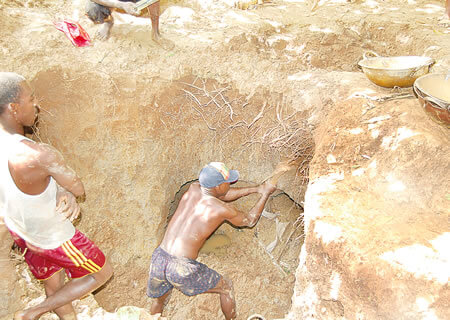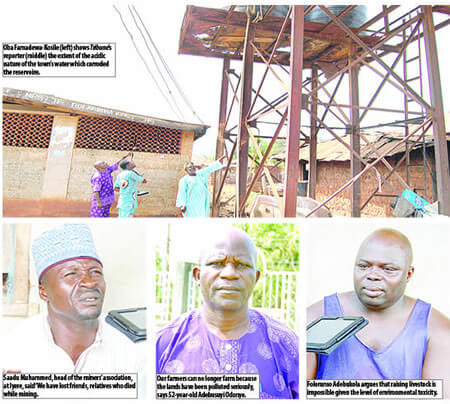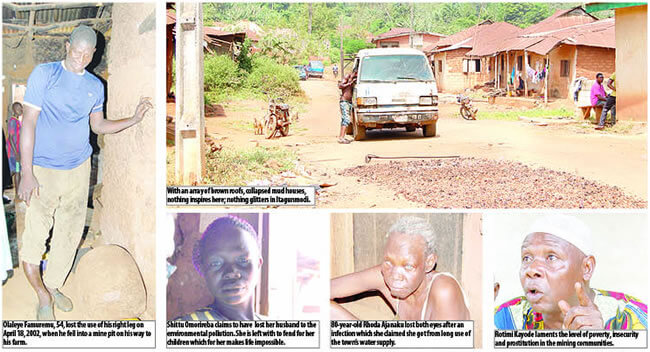For Itagunmodi, Iyere, Igun, Eepe, Gbadeye in Atakumosa West Local Government Area of Osun State, theirs remain one long stretch of a painful paradox. Sitting on huge gold and other solid mineral deposits, their terrains have hosted various shades of illegal mining operations through many centuries. KEHINDE OYETIMI, who visited the residents, reports that the communities have only deaths, environmental degradation, loss of livelihood and lands to show for their natural endowments.
As this reporter, a photographer and a guide entered into the false serenity that had come to be Itagunmodi, the eerie quiet that reached out as welcome was unnerving. The very few people who moved about were too preoccupied with their various states of neglect to bother about the new faces. Two boys were battling with a rusty pumping machine that creaked as they forced the contaminated water out of its depths. The gloom on the faces of the people was scarily infectious.
He coughed intermittently as he struggled to buttress his points. He could barely maintain a steady gaze. He was too weak to do so. When he wheezed, his body jerked uncontrollably in response. His palms were swollen, his hair grey and unkempt, his voice, unsteady. He was a monarch but beyond the royal mien was a sad reality. Obviously, he was ill, battling some respiratory ailment. There was anger in his eyes; he laboured to transfer the storm into his voice. But he failed at intervals. As he spoke through a variety of hushes and vehemence, he cursed the lot of his people, represented in the devastation, diseases and deaths that have lasted through the centuries.
Years of waste, devastation
Oba Michael Olalekan Famadewa-Kosile is the traditional ruler of Itagunmodi, located at Atakumosa West Local Government Area of Osun State. Itagunmodi — renown as the land of gold, basically so because of its rich mineral deposits—has enjoyed a growing reputation as a result of its abundance of precious stones which not many human settlements can boast of across the world.
A relatively large inscription on a raised stone-post with the letterings ‘Itagunmodi: City of gold and peace’ announces the presence of the community. With an array of brown roofs, collapsed mud houses, nothing glittered here. Other adjoining communities— Iyere, Igun, Eepe and Gbadeye—which share such rich gold deposits with Itagunmodi have maintained similar fate of gross underdevelopment.
As Nigerian Tribune interacted with the monarch, it was impossible to ignore the frustration in his comportment. “Our rich gold deposits have remained our undoing,” he started. “We have known nothing but waste and environmental degradation. Our limitations are many. Many people, who have not visited Itagunmodi and other sister communities who have gold deposits as we do, are quick to conclude that this place must have been transformed through the many centuries as result of gold mining activities going on here,” he stated.
“I have been a traditional ruler here for 23 years,” he continued. “I have struggled with a lot of challenges since I became a monarch over Itagunmodi. We do not have a health centre. There are no motorable roads. We have been cheated for so long. People come in the name of the government, brandishing all kinds of licenses. They use these licenses to perpetrate all kinds of fraud against my people.
“All the farmlands have been destroyed as a result of indiscriminate mining activities. Aside that, mining has corroded the water that we drink. Many have died as a result of what can be safely assumed to be chemical poisoning because they drank from the contaminated water deposits. Many have respiratory infections. The acidity level contained in the mining process is destructive and therefore keeps affecting our source of water. We have reached out to the government but nothing has been done concerning this. Even the borehole constructed by the government has been destroyed by the acidic nature of the water going into the reservoir. It has corroded the iron rods used in holding the tanks.
“The health officials sent here have deserted us. We have lost pregnant women for lack of health centres. The foreign miners have taken over everywhere. There are no checks.
“The pits dug during mining have caused bodily injuries and death to many of our people. When it rains, people fall into these open or semi-open pits. Many have fallen to their deaths. Others have sustained terminal injuries; some have lost limbs. The miners have no regards for us the host community. They enter into people’s farmlands and commit havoc. The miners come even from Niger Republic, Chad and other foreign countries. We feel threatened. Many have left the town with their families.
“There is no life here; it is death,” he said, with a tone of finality.
Naturally armed with the capacity to transform themselves into modern towns with all the needed social amenities, Itagunmodi and others have known nothing but increasing environmental degradation, public health hazards and deaths. Like many other gold mining boomtowns across the globe, Itagunmodi, Iyere, Igun, Eepe and Gbadeye, have degenerated into lawless enclaves where alcohol, drug abuse, theft, prostitution and murders thrive.
Oba Famadewa-Kosile, with a fatigued gait, pointed out some of the victims of the unregulated mining activities going on in the area.
54-year-old Olaleye Famuremu, a resident of Itagunmodi, could barely walk when Nigerian Tribune entered his mud house. The problem was with his 14-year-old deformity represented in his right leg which had been fractured after he fell into a hole dug by miners.
Looking pained, he narrated his ordeal. “I am from Itagunmodi. On April 18, 2002, I decided to visit my farm. On getting to a place, I saw two mine pits already dug. There was a narrow path between the pits. I thought it was passable and so I decided to go through the narrow path. Unfortunately, it collapsed and I found myself in a deep pit. My right leg got seriously broken. I have been to various hospitals spending so much on treatment. It has been difficult for me to feed myself and family. I have had to borrow money, amounting to over N600,000 just to treat the leg. I need help. This is what the mining has cost some of us who are residents,” he said.
For 80-year-old Rhoda Ajanaku, it has been one loss after the other. She told Nigerian Tribune that she lost her husband due to respiratory infection. She bemoaned her fate as she has also lost the use of her eyes.
“I really do not know how to start counting my losses. As you must have noticed, I have lost my eyes. My eyes are bad. I can’t see. I have been having the eye problems for a very long time. I noticed that my eyesight was becoming weak. I use water from the wells around here. I do not have any other source. We have been warned not to drink the water or use it in any other way. But where do I get the money or wherewithal to get potable water? I drink it; use it in cooking, bathing. But I kept on using it until it affected my eyes. My husband died as a result of respiratory infection. He would visit his farm which had become polluted by mining activities. By the time his situation worsened, it was difficult to get help for him,” she said.
Shittu Omorireba, 45, could only mutter a few words. The loss of her husband and the burden of raising her kids without support from anywhere have made living difficult for her.
According to her, “There are so many problems here. Many people have died as a result of the toxic water that we are forced to drink. My husband also died as a result of this. I am left with the children to cater to them. It has caused so many problems. I have no other help. Life is impossible here.”
Kayode Rotimi, who is a resident of Iyere, a nearby community equally affected by mining activities, lamented, among other things, the extent of insecurity, prostitution and poverty.
“When we were younger, the number of miners was not as large as this. Today, the number has grown so much that we have become very worried. The gold miners come from as far as Niger, Chad, and some other countries. Of course, many of them equally are from the northern part of Nigeria. Former governor of Osun State, Prince Olagunsoye Oyinlola, was able to curtail the activities of these miners but the present governor, Rauf Aregbesola, decided to allow them more opportunities. It has backfired because they have not only increased their activities but the devastation is huge. Once each miner pays N100 per day to the government, they are allowed to mine anywhere in the town
“It is depressing to say that despite the rich presence of gold here and the many years of mining activities, we have not enjoyed communal benefits. We do not have electricity, potable water, schools or roads. We have no government presence here.
“It is worse because we are helpless. Since the government has allowed such mining, we cannot do anything to stop the land degradation that is daily carried out on our lands. At a point, we became so disturbed about security that we had to report at the police station and the army barracks particularly because of the daily influx of foreigners whose language we do not understand. They come from far in large numbers to mine. Each day, about eight buses enter into this town for such purpose.
“Many years ago, under General Ibrahim Babangida, a gold refining outpost was built so that all the gold mined would be taken there. Unfortunately, that place never saw the light of day. Nobody uses that place. The moment the miners come across the precious stones, they leave the town. We are worse hit by the mining activities.
“It has affected the soil texture of the earth. Our farmers out of fear allow them to mine for a pittance. But our cocoa and other crops get destroyed as a result of the mining activities. It has affected our agricultural produce to a large extent. Those who refuse to allow them use their farmlands for mining are mysteriously killed.
“I must equally add that we refused them bringing their wives and families here. This has given rise to prostitution. Many women find their way here to prostitute,” he said.
Folorunso Adebukola, another resident of Iyere, bemoaned the lot of his people. According to him, “We are very worried. We have no industries here. The mining activities have ruined here. We do not know where to turn to. We feel trapped. They have taken over all that we have. We can’t even raise livestock because of the environmental degradation that is widespread here.”
For 52-year-old Adebusuyi Odonye, another resident, before long the communities face the obvious risk of annihilation except urgent measures are put in place, just as he insisted that “The hazards associated with the mining activities are quite disturbing. It has polluted our water which in turn has poisoned so many of us. The death toll has continued to rise. The miners use all kinds of chemicals in the digging. This has also affected agricultural produce from this area. Many of our children have died as a result of falling into pits that they never knew were there. The government has not done anything concerning this.
“Wherever is dug, the chemicals used would kill any plant life there. We are worst hit by this. Our farmers can no longer farm because the lands have been polluted seriously. We can’t chase these miners away because they claim the backing of government. Today, Itagunmodi, Iyere, Igun, Eepe and Gbadeye have been affected by this.
“These miners meet their deaths most times while mining. In fact, they purchased a land some miles away where they take the bodies of those who die while digging for gold.”
Public health concerns
When Nigerian Tribune visited some of the mining spots, it was a huge spread of open pits. The miners, digging tirelessly, would stop for a drink and smoke and continue with their rigorous engagement. Chemicals of varying colour and smell took possession of the air. Public health experts have insisted that cyanide and mercury which are the two commonest extraction agents used for gold are toxic when released into the water and air.
In his remarks, Professor Kayode Oshagbemi, public health physician, with emphasis on public health disasters and emergency, University of Ilorin, Ilorin, Kwara State, outlined the public health damage being carried out in the area.
“The impacts of mining are very diverse. Mining has negative implications on individual health as well as public health. The pits that are dug constitute water bodies when there are heavy rain falls. These water bodies constitute breeding spaces for vectors that can transmit diseases.
“I must equally add that the residents can come down with respiratory diseases and contamination of their blood system. This is so because of the toxic chemicals used during mining. Members of the public come in contact with these chemicals through the water they drink and use and get infected. Some of them can come down with simple pneumonia to other serious respiratory ailments in the future.
“Also, the chemicals that are used in processing these metals can cause pollution of the water bodies that are available in that area. Livestock and other aquatic lives are affected in the process. There is also degradation which will negatively affect the quality of food that can come from the area. The chemicals used in mining have serious consequence on crops. When people consume these crops, they can be adversely affected. The vegetation of the area is also affected which can result in food shortage for residents. You find out that many of the farmers will record low farm yields.
“In most cases, these miners do not wear protective kits. Many of them inhale very dangerous metallic materials and dust while mining. They get into dark gullies and burrows. They come across all kinds of dangerous animals and reptiles. Sometimes, the pit they have dug also collapse on them while they are digging. Many of them have died in that process. There is no doubting the fact that uncontrolled mining activities constitute health hazards to members of the host communities.
“The government must regulate the activities of the miners. The miners must get registered. Now that the Nigerian government is looking elsewhere aside petroleum, something tangible must be done to regulate the industry. They must be made to follow global standard geological processes that would make mining there less hazardous,” he said.
Professor M.O. Olorunfemi, a geo-physicist from the Obafemi Awolowo University, Ife, Osun State, shared a smilar bent.
According to him, “Itagunmodi is noted for gold and gold has been mined in that community over a long period of time mostly by illegal miners. Every mining activity will degrade the environment. What is being done there is open caste mining. When that is done, a lot of environmental degradation takes place. Gullies, holes are created. The miners, of whatever gems, get affected also. When you create gullies by mining and then it rains, the gullies get filled with water and artificial lakes are created. People get affected health-wise.
“Recall what happened in Zamfara where many people died as a result of mining. The gold in Zamfara is associated with galena. Galena is lead-sulphite. When they get this gold, they will wash into water-galena. The people in that area used the water for drinking and cooking and so they were consuming lead. It became bio-accumulated in their system. When it gets to the toxic level, it becomes deadening. That is why we had a lot of deaths in Zamfara.”
The people should be re-settled —Environmental scientist
Dr Timothy Olabiyi, associate professor, Department of Crop and Environmental Protection, Ladoke Akintola University of Technology, Ogbomoso, Oyo State, highlights the implications on mining on crops and livestock.
“There is no place where mining is carried out that won’t affect the environment. It also affects available lands for farm activities. The minerals are located in the ground where crops are expected to be planted. There are some minerals that are toxic to crops. When mining, these minerals are brought to upper layers of the earth and they do a lot of damage to crops.
“Opportunity cost comes to play here. You cannot mine and expect to maintain a human population on the same expanse of land. There are so many hazards to human wellbeing where mining is involved. The excavation of these minerals would naturally lead to the pollution of the environment. In other cases, mining is toxic to livestock.
“Of course, it is good that we have gold but the government should resettle the people. They should take the people out of the place. Gold and other important gems can be used to boost our economy but something drastic must be done about the people there.”
“Gold or some of these ores often occur with toxic minerals. In the process of mining these gems, the other toxic elements will be bailed out into the water systems. Also, mining involves use of chemicals. These chemicals are toxic. The miners wash them into the streams or water bodies. These percolate into the soil and ground water also. There is always the possibility that the residents get affected by these activities. The health implications are many. The gullies created by digging get filled with water and then they become breeding grounds for mosquitoes when it rains. The residents get affected by all kinds of water-borne diseases which are peculiar to that area. The government should ensure the negative impacts are ameliorated or reduced to the barest minimum. Mining destroys the environment everywhere in the world.”
‘Many of us have lost friends, relatives who came to mine’
Head of the Hausa miners’ community in Iyere, Saadu Muhammed, painfully recollected how many of his fellow miners have lost their lives, decrying the crude implements being used for the trade.
“I am from Zamfara State in the North. I came here because of the mining activities going on here. I have been involved in the activity for over 30 years. We are very many here. We have tried to maintain a very cordial relationship with the host communities. It is a very dangerous engagement. Many of those who came to mine have lost their lives in the mines, possibly due to the crude nature of our mining activities. On many occasions, we dig for days before coming across any precious stone like gold.
“The government collects 100 naira from each of us per day. A ticket is issued after payment and that permit lasts for just one day. We expect the government to help us and not just to abandon us after paying them,” he said.
Mustapha Ngira was seen digging while others watched. He told Nigerian Tribune of the dangers inherent in the business but insisting that the venture in some instances could be worth it.
According to him, “I have been in this mining business for over 22 years. I travelled from Kaduna State. We are very many here. It was joblessness that drove many of us to these pits. We have middlemen who supervise us. I have found gold and other precious stones. I can’t disclose how much we sell. But once you hit a precious stone like gold, you make a huge sum of money. I must say that it is very dangerous. We have our ways of determining the presence of gold in any parcel of land. Once we make certain, we start digging. If you are lucky, you get it and if not, you come back to try again.
“I must also say that many have died in the process. We purchased a piece of land where we bury those who died while digging. The job is very risky and hard. There are no hospitals here. When we get injured while mining, we have no hospitals to get to.”
FG loses 100kg of gold every day to 10 million illegal miners
The Minister of Mines and Steel Development, Dr Kayode Fayemi, stated that Nigeria boasts of 10 million illegal miners, making it lose 100kg of gold daily to this.
“The truth of the matter is that this is very pervasive. It is extensive; it is all over the country. There may be as many as six to 10 million Nigerians involved in this. We need to reduce the use of mercury to the barest minimum. In fact, to make it illegal. That way, they will be forced to use safer processes. About 100 kilogramme of gold leaves the country everyday without any record.
“We have decided that we will give them licenses, that is, mini licenses for their areas. Let them come under artisanal and small scale mining offices,” he said.
With about 10 million illegal miners plying their trade, 100kg of gold leaving the country each day without any record and the level of environmental degradation and avoidable deaths cross the country, it would indeed be difficult for the nation to contain the various areas of loss. Like Itagunmodi and its neighbouring communities, the devastation would continue unabated given the near handicap of government at various levels to develop workable frameworks to check the fatal excesses of the perpetrators.








